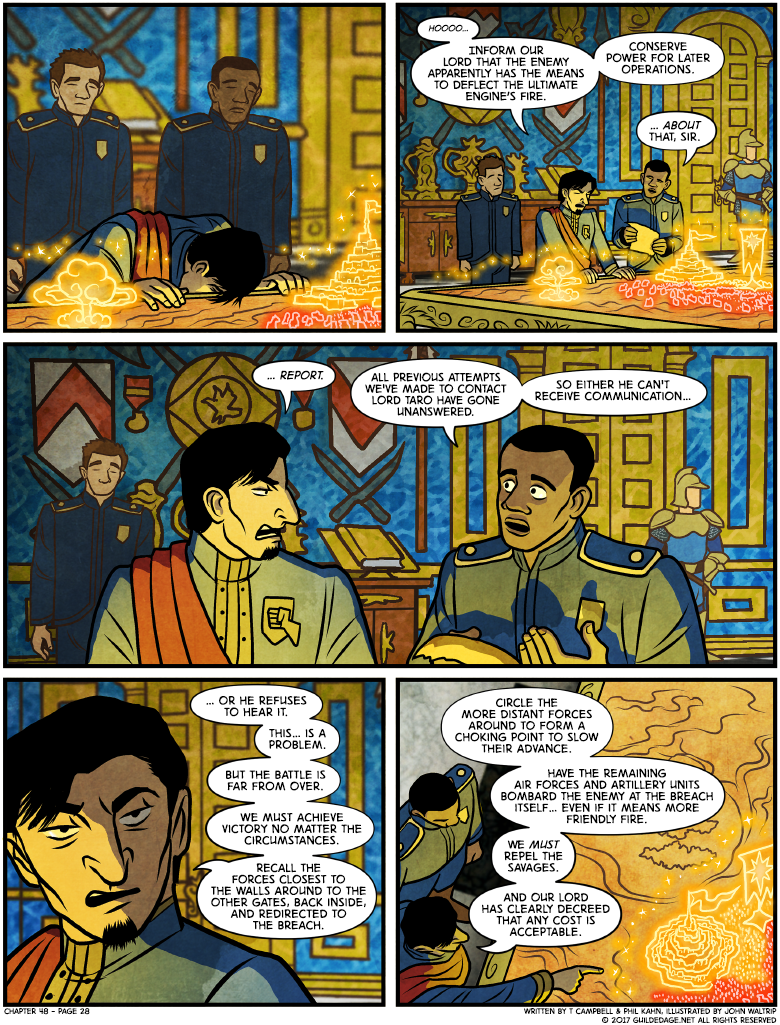Annotated 48-28
 This was our actual eight-year anniversary page. We’d always stopped the story to mark the event with an Adventurer’s Illustrated before, but this time we didn’t want to lose the momentum. It ran without an FB ad.
This was our actual eight-year anniversary page. We’d always stopped the story to mark the event with an Adventurer’s Illustrated before, but this time we didn’t want to lose the momentum. It ran without an FB ad.
As I said before, I wasn’t too impressed with Jarvis’ claims that he and the Altruists had engineered everything about Gastonia’s situation up to the Altruist coup. But the closer he gets to defeat, the more I find myself respecting him. He’s deeply flawed and arguably villainous, but he does have one heroic quality: he will never, ever yield to despair, no matter how hopeless things look.
If not for him, this war would probably have been over days ago. And if Taro’s coup had failed and Iwatani Sr. was still running things, who knows? The Rebels would still have the super-power advantage, but that’s a lot of their offensive capability concentrated in the bodies of a few poisonable people. Jarvis might’ve held the line long enough to hire a few assassination squads or figure out some other counter. He might have 1 in 10 odds of victory or an acceptable stalemate.
But there’s only so much that even the greatest generals can do when sabotaged by their own chief executives.











Jarvis quickly bounces back from despair, evidently.
Still, I love his reaction in the first panel.
I wouldn’t go as far as call his efforts heroic. While this mirror a ‘heroic last stand’ trope, it also mirrors desperate actions of actually villains in history. I guess it’s perspective in the end.
I feel the same way. Heroes usually don’t -can’t- give up because the fate of everyone depends on them winning. Jarvis is just convinced that he’s a superior man and he can’t permit himself to such a base and disgraceful thing as losing (or even worse: acknowledging defeat) Plebes are defeated often; leaders never are
I think those two things are actually less different than most people think.
If you have a purpose and a responsibility, and you hold on to both, in the face of defeat, at great personal costs (and possibly despite an option to withdraw instead), that may well be called “heroic” by many people who don’t think that your purpose is an evil scheme and the responsibility to a mass-murdering racist regime.
Nobody ever does evil for the sake of evil. They do it either because they see something good and/or useful in it, which ultimately serves a worthwhile objective — or at least they did at some point, and haven’t gotten around to re-evaluating that decision (possibly because they had to defend themselves against a bunch of people calling them evil, which obviously would get most humans to double down on what they’re doing)
I gotta disagree with your statement about “Nobody ever does evil for the sake of evil,” unless you’re saying that a genuine bully’s sadistic pleasure at causing someone else’s misery is what you referred to in “they see something good and/or useful in it.”
They are not doing it basically to fulfill a need for bullying. They are doing it because they need to feel the rush of being in control of other people.
No, probably not because “they’re themselves weak” or “they themselves suffer”. But they are not doing it so that evilbadhaha you suffer, but because they enjoy that you suffer.
Consider it their version of watching a movie instead of cleaning. Both can be fun and many people derive great joy from cleaning and keeping their surroundings neat. So if you’re instead watching a movie and sitting on your arse, are you just hopelessly lazy and can never do better?
In same vein, but way different in perspective, people are hurting others instead of helping them. Again, two activities that can be highly rewarding to people inclined on them, but pure torture to those who are not inclined.
And before one states that helping is clearly better than hurting… Yes. Yes, it is. But then we could get into talking how “not helping” is actually hurting too by not… Well, helping… Then it again starts to slide. No doubt you too have made many a conscious decisions of not helping someone, aka actively deciding to work against someone?
“But that’s not the same!” I hear you cry. No. It isn’t. In scale. But the idea is already there. To some your needs and feelings don’t really matter that much. To some they don’t matter at all.
But they all aren’t doing it because they hahaevilbad want you to suffer. They do it to entertain themselves and helping themselves on your expense.
Now of course this is very likely somewhat different to how Zak would put it, but its supposed to be just my take on it anyway.
To put it short: Imagine feeling good as a bread. There’s now two people who want it and one who has it. Then the other decides that the other does not deserve to feel good, so they take that from them. They did not do it because they especially wanted the other to not have it, but because now they have it instead and enjoy it, feeling fulfilled for a moment more before they go hungry for the feeling again. And we are all rather ravenous in that regard, we just eat very different types of good feelings.
1: What Velgar said. I’d have phrased it differently but he’s basically right.
2: People usually do whatever they either enjoy, what they think will benefit them, or act out of habit, which in turn is shaped by their history, culture, environment etc. and may or may not be “good”, of course. None of these things is “good for goodness’ sake”, by my accounting. That would only be something that somebody does specifically because it is good (for others), *although* it’s not what they would otherwise do, and although it might put them at a disadvantage. So the equivalent “evil for evil’s sake” scenario would require someone to actively go out of their way to hurt others although they don’t like to hurt others, and although they think that there’s no need to hurt others, no benefit to be derived, but some risk taken by bringing everyone else up against oneself — but believing that this was a worthwile price for increasing the amount of misery in the world.
There is certainly a lot of evil shit out there, but I don’t think you’ll find anyone who would act like this, outside of superhero comics and 1980’s action movies.
You get people with messed-up ideologies, ruthless criminals, psychopaths, or even well-off philantropists and idealists who don’t realize how they’re actually part of the problem they’d like to believe they’re solving. And you get crazy combinations of those, but all of these people have a way of either seeing themselves as good, convincing themselves that some eggs need breaking in order to make the world better, or simply dismissing the notion of good/evil altogether. I’m pretty sure that Jarvis actually believes he’s one of the good people who just need to take care that exaggerated ethics does not deter them from What Must Be Done to create something good in this horribly messed-up world.
One could sum it up like this: He will fight till the last man he has. That man will not be himself. He is directing from the safety of a staff room, like the generals of WW1.
No heroics possible in that setting, save for one: Planting an explosive device to take out the Führer… just make sure you use a bigger bomb.
All true, and nobody’s claiming he was in any way “good” — but if he were purely selfish, he could probably still organize a way for himself to get away. So he faces insurmountable odds but refuses to give up and get himself to safety, for the sake of whatever purpose he’s assigned to his life. I think that does justify the word “heroic”, at the same time it does *not* justify the word “good”.
How can doing your job be heroic?
I mean, the alternative is “Quitting and running away, before it’s clear whether the day can be won”.
And yeah, the alternative is the opposite of heroic.
But “not-the-opposite-of-heroic” doesn’t mean “heroic” itself. It’s everything from heroic to “just barely performing one’s duty”.
Love how the first panel also serves a narrative point showing that the WMD landed far away from the fray.
Beautifully illustrated, as we’ve become used to, but still needs to be recognised.
Jarvis has kept his head and is still working to achieve the best advantage for his nation. He’s been betrayed, from above and below, but stays true to his calling.